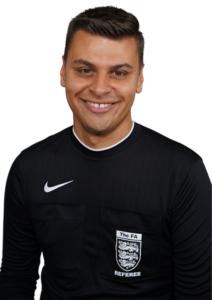There is never a bad time for referees to work on some of their ‘non-negotiables’. These are keys things that they will commit to doing every day that they know will positively affect their performances out in the middle. Now you might be asking: how does this link to sleep?
Well, despite having years and years of experience at sleeping, most of us are still rubbish at it. A majority of people see going to sleep as a passive thing; meaning that when they feel tired, they go to bed and that’s it. However, in reality, sleep should be an active behaviour that you think about as an investment in your recovery, performance and wellbeing.
The best officials see sleep as one of their hidden weapons and as one of their ‘non-negotiables’. So, given that now is as good a time as any to work on our own ‘non-negotiables’, I thought we’d explain why sleep should be on your list, how it helps and how to do it better.
Why is sleep so important and how can you get better at it?
Why do we Sleep?
There are several different beliefs on why we sleep. For example, some suggest that we sleep as it helps our body to heal, rest, grow and conserve energy, whereas others suggest that we sleep to help our brains grow, process and consolidate information that we have learnt better. We still don’t have a precise reason for why we sleep, but regardless of what stance you take, it is beneficial to all referees.
How Does Sleep Help us?
In general, sleep improves our concentration, memory, insight, creativity and helps to boost your immune system too. But why is it even more important for officials?
The way in which a referee prepares for a game is extremely important; and this starts the night before matchday with a good night’s sleep. Research has shown that when officials got a sufficient amount of sleep, their speed increased by 5% and the accuracy of their decision making increased by 9%. These are large margins in refereeing where small differences can make a big impact on the seasons of the officials and the teams they referee.
Research examining the impact of sleep on recovery in elite officials highlights how sleep deprivation may lead to impaired muscle damage repair and muscle glycogen repletion. Furthermore, from a psychological standpoint, sleep has the ability to improve cognitive functioning and reduce the likelihood of mental fatigue. This means that the with more sleep referees can improve their reaction times too.
Another important reason to get more sleep is because a reduced amount has been linked to an increase in injury rates and illnesses too! For example, one study showed that adolescents who had less than 8 hours of sleep were more likely to experience injury compared to adolescents who had more than 8 hours of sleep.
So, how do you know if you are getting enough sleep? Consider taking the pillow test:
The Pillow Test: The United States National Institute of Neurological Disorders and Strokes explains that if you fall asleep within 5 minutes of your head hitting the pillow each night, you probably aren’t getting enough sleep. Try this tonight, and if you notice that you’re falling asleep too quickly, make it a priority to get more sleep.
How Much Sleep is Enough Sleep?
There is no exact answer for how much sleep people need, but experts tend to recommend about 7-9 hours a night on average. The amount of sleep you need depends on your age, with adults and older teenagers needing less than children. A recent survey found that the majority of the population are getting less than 6 ¾ hours of sleep each night.
Why is Sleep More Difficult For Referees?
During the season, there a few reasons why getting the right amount of sleep for referees can be tough, for example:
- Often officials train early in the morning and can referee games late at night.
- Some officials must travel a lot which reduces when they can sleep.
- Most environments that referees officiate in are very stimulating.
This is why now is the perfect time to get into a good sleep routine. So, what can officials do to make sure they get better at sleeping?
How to Get Better Sleep
What to Avoid
There are lots of mistakes that people make before they go to sleep. This list includes:
- Staying in bed when unable to sleep – If you can’t fall asleep within 20-30 minutes, get out of bed and do something that occupies your brain without stressing yourself out. Interestingly, for those people that stay in bed for longer, their brain starts to learn the association between being in bed and being awake which makes it harder to fall asleep!
- Using your phone in bed – Melatonin (the sleep hormone) gets released when it is dark. If you are using your phone or tablet in bed, your brain is fooled into thinking that the bright light from your screen means it is daytime, and stops melatonin being fully released, keeping you wide awake.
- Napping for too long – The research still isn’t clear when is the perfect time for a nap, although anything over thirty minutes can leave you feeling groggy for quite a while before you feel the full benefits. If you nap for too long before your normal bedtime, you won’t feel tired again until very late into the night.
- Caffeine – For referees, caffeine can be like a doubled-edge sword. On one side, it can boost alertness, increase reaction times and enhance endurance and intensity on shorter exercises. On the other hand it can take up to an hour to wear off and can have a 4 ½ hour shelf life. So, we think the best advice is to manage your caffeine intake and factor your sleep into it too. For example, where possible, try to avoid caffeine 4 hours before bed.
What to do instead
- Have a regular bedtime / wake up time – Where possible, getting into a habit of sleeping and waking up at specific times will help keep your body clock consistent. For example, during the week between matches.
- Take a hot bath at night – Your body temperature drops when you sleep. You can prompt this sleepy state by taking a warm bath. This will also help relax your muscles and make it easier to fall asleep.
- Wake up properly in the morning – Doing certain things when you wake up, like hitting the snooze button, can affect your sleep cycle as well as making you feel groggier and less refreshed and prepared for the day.
Final Reflections
So, the research is pretty conclusive: those who get a better sleep at night get a range of physical and psychological benefits and this is more profound for officials. A final note is that sleep is about consistency. One good night’s sleep the night before a match may work in the short term, but for longer term benefits make sleep your priority.
At The Third Team I work individually and in collaboration with different professionals where I have developed workshops and 1-2-1 sessions associated with Resilience and Mental Toughness Development to help referees. The workshops and 1-2-1 sessions are interactive, where referees are encouraged to open up and share their experiences to help themselves and each other.
Feel free to contact me if you’d like to know more about my workshops or 1-2-1 sessions and how I could help you or your officials.
Best Wishes,

Nathan Sherratt
Referee Educator & Managing Director of The Third Team

Nathan Sherratt
Nathan Sherratt, Referee Educator, Resilience Trainer and Managing Director of The Third Team. A Mental Toughness Practitioner based in County Durham, North East England.

